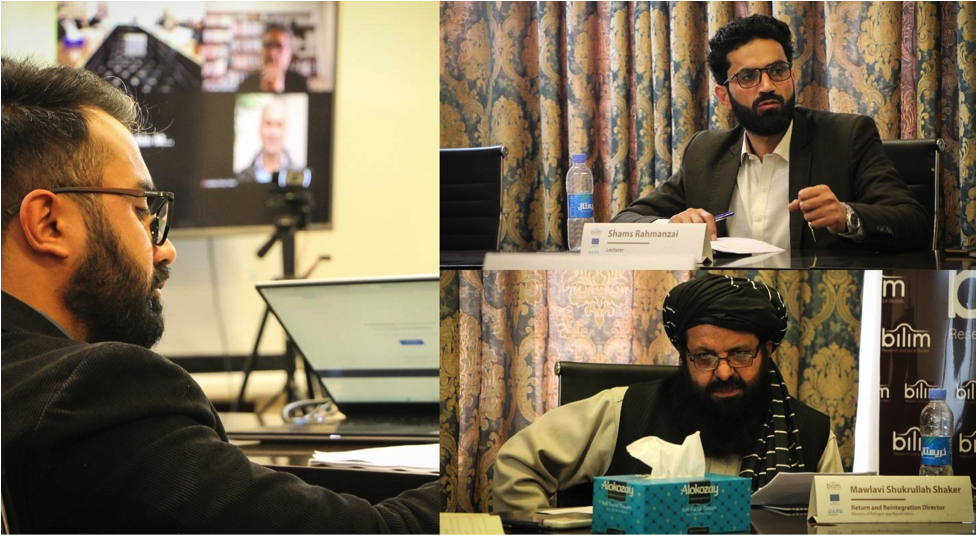Stakeholders Expert Panel Discussion on Afghanistan’s Return and Reintegration Policies
The Expert Panel Discussion on Afghanistan’s Return and Reintegration Policies took place on March 9, 2024. Experts explored Afghanistan's return migration and reintegration policies and the challenges encountered in their implementation at macro, meso, and micro levels. Panelists, hailing from diverse backgrounds including government, non-governmental institutions, and academia addressed topics such as return diplomacy, institutional environment, return procedures, and experiences of returnees before and during the return process, including post-return socio-economic challenges.
Before engaging in the discussions concerning challenges encountered during the process of return and reintegration from both macro and meso analytical viewpoints, panelists were presented with first-hand selected narrative returnees gathered as part of the GAPs project about reintegration challenges from macro and meso perspectives.
Mr. Hatif Zelgai, the principal quantitative research enumerator from BILIM, expounded upon accounts depicting the psychosocial adversities experienced by returnees across various migration trajectories, including returns to Afghanistan from Iran, Turkey, Pakistan, and Europe. These narratives derived from interviews with returnees, gathered in Mazar-e Sharif, Herat, Kandahar, and Kabul between October and November 2023.
The narratives, derived from interviews, served as the foundational framework for discussions among the panel participants. The Acting Director of Policy Planning at the Ministry of Refugee and Repatriation in Afghanistan, Mr. Mahmudolhaq Ahadi, affirmed that the Interim Government of Afghanistan is cognizant of the hardships endured by Afghan migrants, including incidents of forced deportations and the infringement upon their fundamental rights by security officials in host nations, notably in neighboring countries such as Pakistan. In addition to his remarks, Mr. Ahadi emphasized that the Interim Government of Afghanistan maintains a strong commitment to the Refugee Convention and its Protocol. Representatives of the Interim Government of Afghanistan emphasized the following key institutional and macro-level viewpoints:
The Interim Government of Afghanistan is dedicated to using all available resources to ensure the protection of returnees and to facilitate their reintegration within the country,
The host nations should adhere to international legal frameworks and uphold their obligations under these agreements by affording protection to Afghan migrants.
The international community should assist the Interim Government in establishing sustainable mechanisms for return and reintegration within the country.
Responding to a question regarding bilateral agreements concerning return and reintegration with the Islamic Republic of Iran and the Islamic Republic of Pakistan, Mr. Ahadi indicated that annual meetings are being regularly convened between Afghanistan, Iran, Pakistan, and UNHCR to address issues related to return and reintegration.
Dr. Ali Zafer Sağıroğlu, Director of the Migration Policy Center at Ankara Yildirim Beyazit University, offered insights into the broader context of irregular migrants in Turkey, with a particular focus on the situation of Afghan migrants and the return procedure to Afghanistan. In this context, Mr Ahadi, stated that the Turkish Government has been supportive on all fronts with the Interim Government of Afghanistan, and he emphasized that they have agreed to establish a joint technical team to oversee the matter of the return and reintegration in Afghanistan. Both Dr. Ali Zafer and representatives of the Interim Government of Afghanistan emphasized the importance of Turkish support in terms of technical and financial assistance to Afghanistan, to enhance the processes of return and reintegration within the country.


